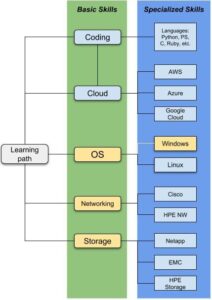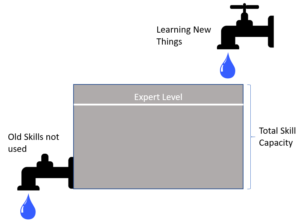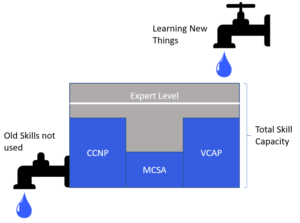Regarding this nice article, I read while ago from Eric Shanks: https://theithollow.com/2018/03/26/fill-skills-tank/.
I decided to write about it as it’s always in my mind since he published it. In particular, I will talk about what we should learn in order to fill a gap for a position/job in any technology and my experience.
Which path to choose?
I started learning Microsoft (MS) products and then I learned other technologies like Virtualization, Cloud, Storage, etc. In any case, you don’t have to worry about which would be your first technology because you can move later if you realize it doesn’t fit you.
For example, you can start learning Linux (I hope I had taken that path!) instead of Windows and then move to Windows or learning about Storage, any path would be correct as long as you continue to learn the same technology or a new one.

When you start learning, you have an idea of what do you want to learn: Network, Cloud, Storage, etc. and then try to master that technology or move on to another one. Hence, you must start somewhere in order to grow your knowledge and then, you will decide which technology or technologies do you want to focus on.
As soon as you start you will notice if you like or not, but choose one!
Knowledge lost as a tank with a leak.
As I mentioned at the beginning of this post, Eric Shanks mentioned in his blog https://theithollow.com/2018/03/26/fill-skills-tank/ , is like filling a tank (which drains as time passes by) with your knowledge:

When you learn a new topic it stays in your mind (won’t drain) as long as you keep using it, hence you will gain different levels of knowledge within the topic, in some years maybe you will achieve an advance and then maybe an expert level or maybe not, as not everyone has the ease to learn things. Also, remember that to maintain a certain level you must update your wisdom (due to the topic is always acquiring new updates or features) about the topic and therefore more effort and time to put on.

You can try to learn other things and try to earn the same level of knowledge in each one but, it can be tough to do…You must spend a lot of time updating the different topics and to maintain it. So, we should try to fill our tank with the knowledge we really want or desire (by testing, reading, writing, etc.), in this way, we could maintain a great level of wisdom but, nothing is more useful than practising!
In my personal experience, when you are learning something new (by reading or watching videos) at the end, there is nothing more useful than practising it in a lab, even if you know the steps.
It’s really a way to ingrain in your mind those steps and if you fail when deploying a new product or feature it’s even better 🙂
Filling the gap, but which?
This is what I really wanted to talk.
Sometimes, it can be really hard to achieve a new position because you notice that there are some gaps between your skills and the desired position/job.
About dream jobs…
For example, if your dream position is to be a Technical Architect, you must be good enough in a lot of topics (networking, storage, virtualization, soft skills, etc.) but, can be very difficult to earn expertise on each area(without mentioning the soft skills needed).
As you know, each matter has sub-matters, for example, if you want to learn VMware, you can learn the Server virtualization platform (vSphere) but, there are other areas like Storage virtualization platform (vSAN) and Network virtualization and Security platform (NSX) for example.
So, here we see that you can be an expert on vSphere but, a lot of positions will demand that you know about vSAN or NSX for example, and you spent a lot of time and effort on being a great expert on vSphere.Then, do you really need to gain an advanced level before applying to a position that requires it?
Well, it depends, you should figure it out with the Recruiter but at least earn an entry level in the skills that the job requests.
We can conclude that to achieve that position, you must do an approach to each technology so, it usually takes a lot of years of experience and learning
About filling the gap
Another example, if you are a Windows Administrator and now you want to learn about Azure, well, it’s related to Microsoft but it’s different than learning about an another OS. In this case, you should gain knowledge in areas like Storage, Networking and maybe some coding skills.
Hence, we can conclude that you should try to learn at least a bit of every technology (related to your main knowledge) and trying to maintain/update your knowledge in those areas.
Also, bear in mind that the more you learn about different topics, the more you «lose» in other ones, so, my personal advice is to stay close of what do you want to learn and don’t be shy to learn about what you don’t.